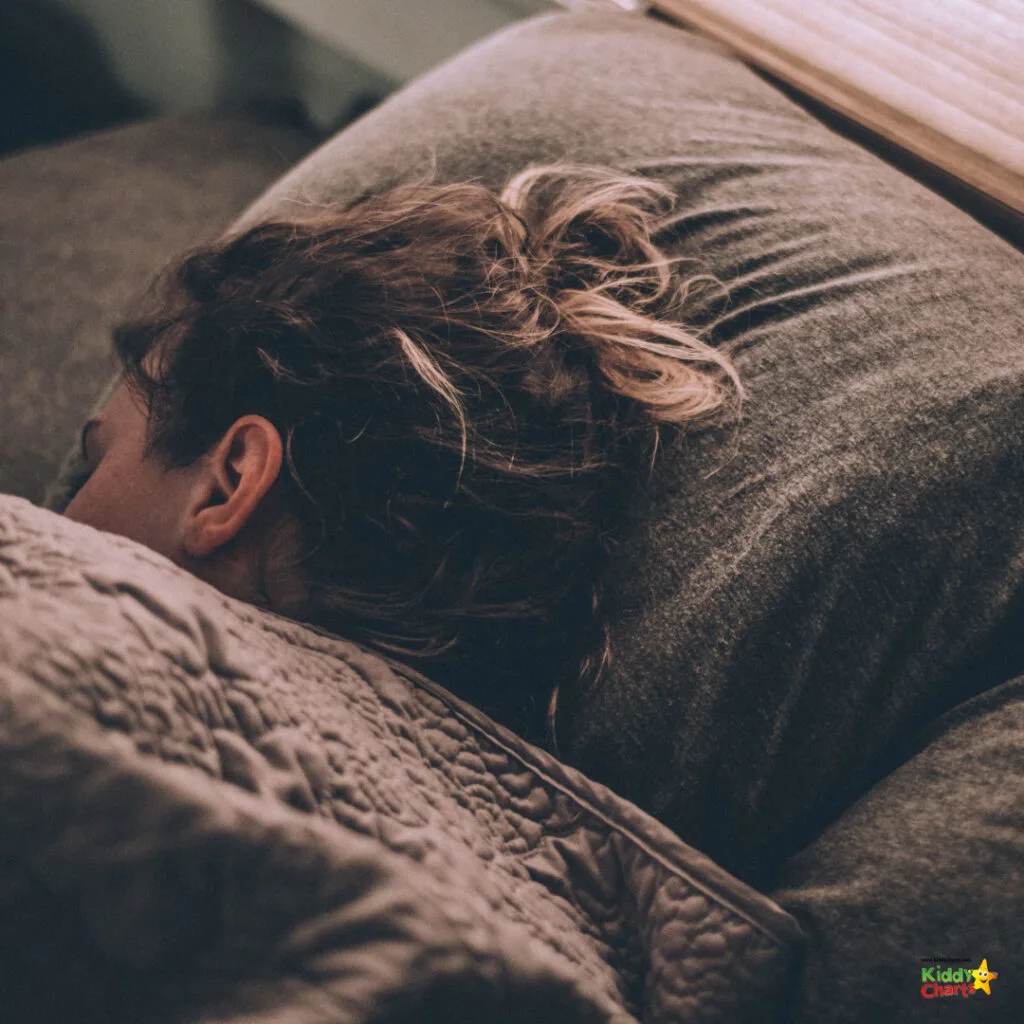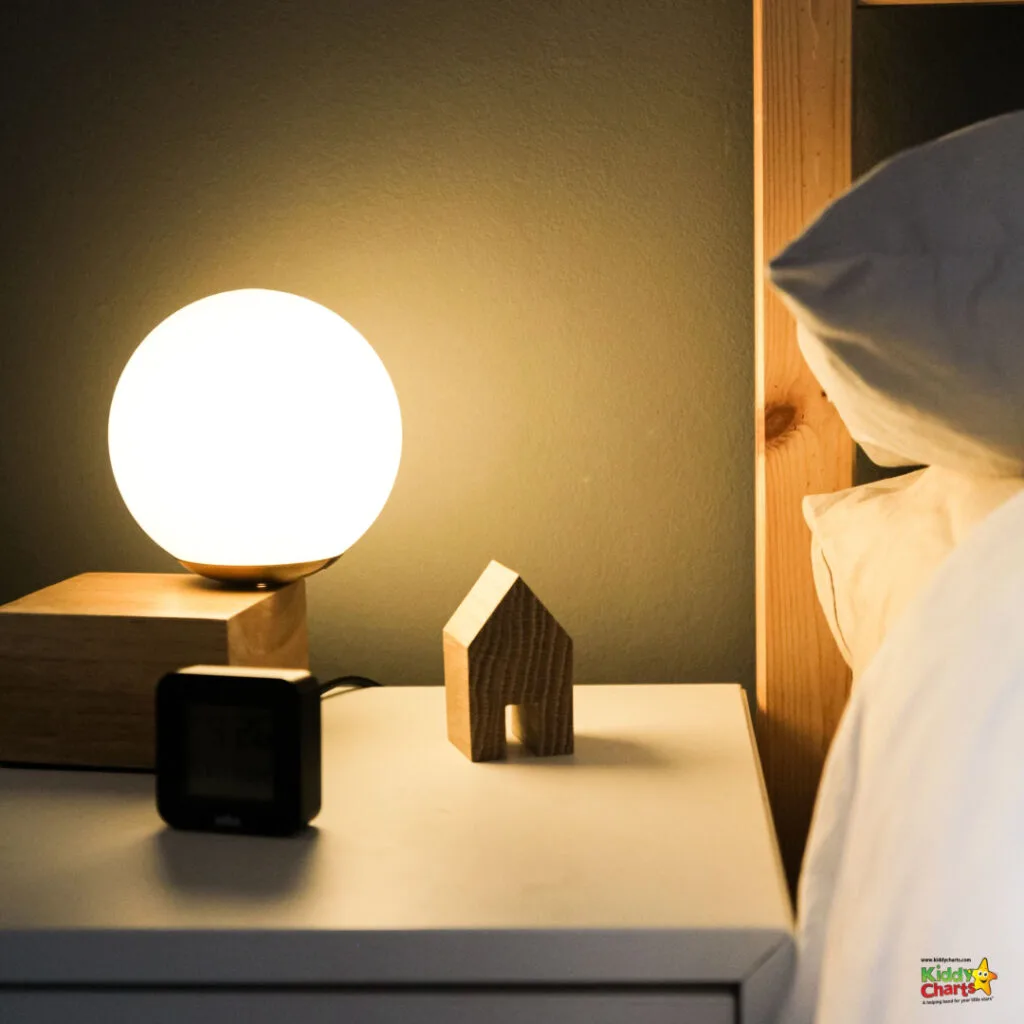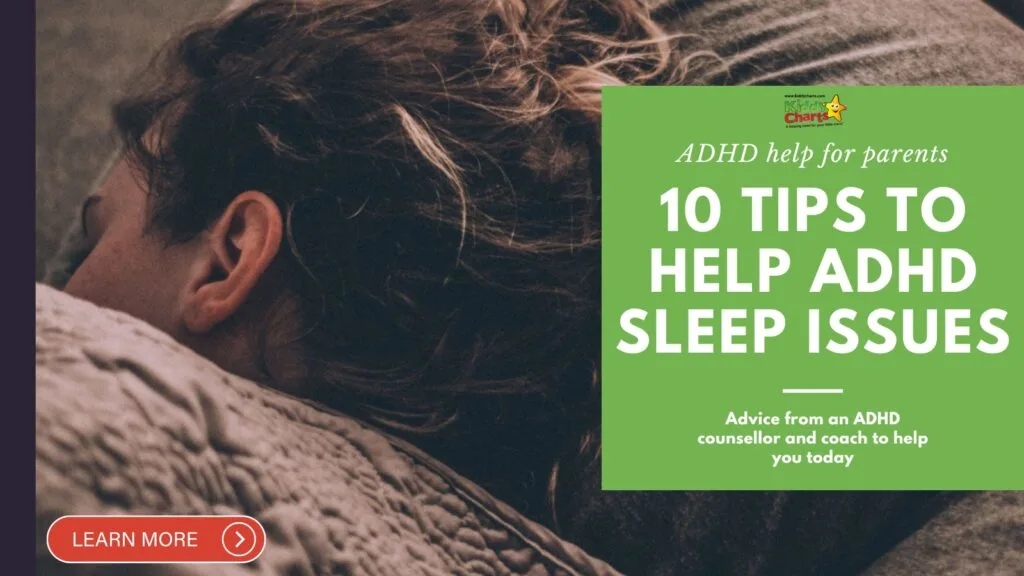It’s only been in the last year that ADHD senior medical professionals have decided that insomnia and sleep problems are not a comorbidity or coexisting condition of ADHD. It is now considered that these are ADHD sleep issues and both are actually part and parcel of the condition. If you speak to anybody with ADHD or the parent of an ADHD child, about the issues attached to their ADHD, it won’t be very long before they start talking about sleep.
This is another article in our series of ADHD resources for parents and teachers that have been put together by Sarah Templeton from Headstuff ADHD Therapy.

What ADHD sleep issues are there?
Before we talk about why the majority struggle, we will talk about one of the aspects of sleep that affects particularly those diagnosed with the Inattentive type. Some people with Inattentive ADHD can feel permanently tired.
No matter how long they sleep, they wake up exhausted. My Inattentive ADHD brother used to amaze us when he would literally come home from work on a Friday go to bed, sleep all weekend and then get up on Monday and go to work. And I have numerous friends who have Inattentive ADHD and Inattentive children who say they just don’t seem ever to be able to get enough sleep to feel awake, refreshed and ready for the day.

So lethargy, never feeling you have enough energy, and feeling permanently wiped-out can be a debilitating side-effect of Inattentive ADHD. A lot of these adults go on to be diagnosed with ‘chronic fatigue syndrome’ so this gives you an idea of how crippling sleep problems can be for this group.
There are a group of ADHD people who need very little sleep
This is almost always those with the Hyperactive/Impulsive presentation and sometimes with the Combined presentation. These characters need very little sleep. In fact, I have known young ADHD boys happily go 2-3 or even 4 nights with no sleep and feel perfectly fine! One even told me he had had no sleep the entire week he had been working as a scaffolder which frightened the life out of me. But he assured me that he had felt as awake and alert on the Friday as he did on the Monday. Some of these ADHD children, right from babies, will need a lot less sleep than other people.

They can literally function on between two and four hours sleep a night. This staggers those of us who need a lot more but it honestly is true. There are a lot of ADHD kids who will be permanently buzzing and feel just as good after four hours sleep as you will after eight.
Then there are the final group. These are ADHD kids and adults who struggle to sleep, find it extremely hard to either get to sleep, stay asleep or wake up far too early in the morning. And when they don’t get enough sleep, feel extremely rough the next day. I would estimate this is the biggest group of all three.
Top ten tips for those struggling with ADHD and sleep
So I’m going to give you my top ten tips for your children who struggle with sleep, but who desperately need the sleep. It’s well worth seeing if any or all of these tips will help them.
1. Turn on the blue light
Always make sure their phones, tablets, or any devices are turned to blue light, rather than bright white, light, a good few hours before they go to bed. This will automatically help to calm their brain down.
2. Get going with a routine
Try and have a routine that they stick to when it comes to bathing, hair wash, nighttime snack, time in bed reading, or whatever they and you decide is right for them. The more they stick to a routine, the more their brain is going to get used to doing the same thing at the same time and sleep should come easier.

3. Keep it calming
Make sure their bedroom is as calm and as peaceful a place as possible. Walls covered in dinosaurs or active-scenes and anything dangling from the ceiling is going to keep their brain active at night when what we are actually trying to do is calm their brain down. Much better is to have muted, dark coloured paint, not too much on the walls and all of their ‘stuff’ tidied away rather than littered around the room. So this may mean plenty of cupboards, wardrobes and chests of drawers so that all the bits and pieces they use in the day are away and out of sight.
4. Limit food late at night
Make sure they don’t eat too late at night. If they do want a drink or food near bed time, then choose wisely. Warm milk, chamomile tea, hot chocolate – there are plenty of sleep-inducing options on the market that will actually help calm a brain down in the evening so make sure their last drink is something that will be helpful when switching their brain off.

5. Use aromatherapy
Sleep-mist pillow spray, roller balls with sleep inducing oils in that you rub on your wrists, and essential oils that assist with sleep in a diffuser can be massively helpful. Aromatherapy assists hugely with relaxation and being able to drift off. Amazon is a very good source for these and will also guide you on which essential oils help with sleep. Moon and stars projectors on the ceiling also help.
6. Consider sleep hypnosis
Something I have always found incredibly useful is sleep hypnosis. There are free apps on the phone and if your child is really struggling, I strongly suggest you try some different sleep apps which can be played on loop all night. These need to be loud enough to be heard, but not so loud they are annoying. I have played sleep hypnosis constantly through the night for the last 20 years and cannot begin to tell you how successful it is. It’s not ideal to let your child use their phone for this as it will be too tempting for them to grab it when they can’t sleep. Better is to use an MP3 player or even Alexa.

7. Think about asking for Melatonin
If all of this is failing, don’t be frightened to ask your GP for melatonin. Some parents swear by it and say it has changed their child’s sleep pattern for the best. You can also buy it in gummy bears from Amazon. For some, this is literally life changing so it’s definitely worth a go.
8. Wind it down before bedtime can ADHD sleep issues
It’s a good idea to allow your child some time in bed to wind down, but a very bad idea to make whatever they get up to to stimulating! Remember we are doing everything to calm the child’s brain down. So if they read books that is a very good idea. If not listening to music or an audiobook is also very sensible. What isn’t sensible is allowing them to be on the phone or tablet when they are in bed, because all the does is stimulate their brain and keep them awake longer.

9. Take note of your child’s sleep patterns
When you have five minutes spare, Google Delayed Sleep Phase Syndrome. If you have a child who seems to permanently want to stay up till 4:00 AM and sleeps beautiful till lunchtime, they could have this condition. It’s where your circadian rhythm is reckoned to be about four hours behind everybody else’s. I have it so fully understand how difficult it is with our Duracell Bunny brains simply going on for longer than other peoples and we can quite happily be lively till 4 or 5 o’clock in the morning. This is difficult when at school, but adults like me tend to arrange our lives so we work in the afternoons and evenings.
10. We know it’s tough: But be patient and kind as often as you can
Have patience and understanding for children who want to sleep but just can’t and who stagger to breakfast at 11:00 AM with black circles under their eyes. They will be more tired and therefore more emotional and you might need to adjust things with their school for a period, so that they go in later and do more homework at home in the evening.
Once you have a diagnosis in place, school can make reasonable adjustments to support your child, so it is worth having an open and honest discussion with them if sleep is a real issue for you.

We hope that these ideas are helpful to you for any ADHD sleep issues that have. Sleep is a big things for some with ADHD, either getting too much, or not enough at all. Good luck with everything. If you need more details on ADHD, do check out our ADHD resources, including some of the other articles in our ADHD series:
Articles on ADHD from KiddyCharts Part 1
Here are the first in our series of articles to help and support parents and teachers to understand ADHD in kids
ADHD comorbidity: What co-existing conditions you might need to look out for
Our first article in the series looks at the ADHD co-existing conditions.
Emotional dysregulation in ADHD kids: What is it and how to handle it
The second article from Sarah Templeton explains what emotional dysregulation is in ADHD, and how to deal with it.
What is rejection sensitive dysphoria and how does RSD ADHD appear in kids?
The third article covering ADHD focuses on RSD, or Rejection Sensitive Dysphoria. What is it, and how does it manifest in ADHD?
ADHD medication guide: To medicate or not to medicate that is the question
Do you want to know more about ADHD medication? Then check out this handy guide from Sarah Templeton.
ADHD and procrastination: Why adults and kids do it and how to stop them?
Procrastination is a real issue with ADHD - what and why does it happen and what can you do about it.
Here are some more articles on the topic too for you:
Articles on ADHD from other sites
Here are some more articles from some other kid-related sites that also cover ADHD
Top Tips For Caring For Your Child Diagnosed With ADHD
Some tips and ideas for helping your child with ADHD.
The Surprising Link Between ADHD and Anxiety
As we have said, social anxiety is often linked to ADHD; here is another article looking at that link.
10 Things Other Parents Need to Know About ADHD in Girls
ADHD preents very differently between boys and girls. Here are some things that other parents should know about it.
Do sign up to our newsletter if you like the site as well – this one is weekly:
We’d love to see you again, so do stop on by if you can.
Take care,
Helen










